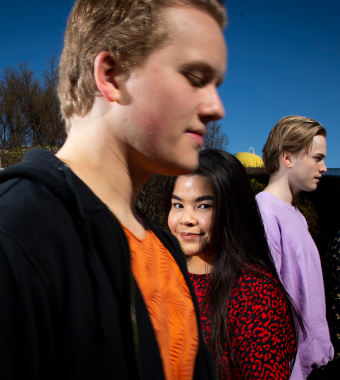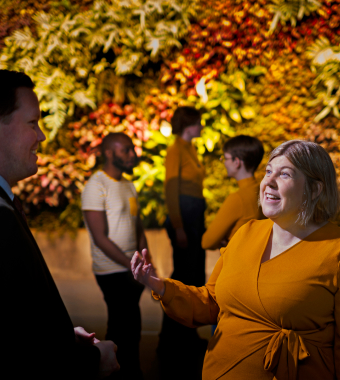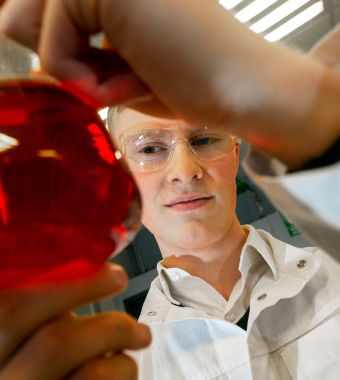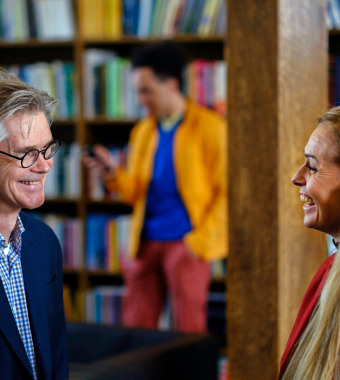Vision for UI26
A Better University for a Better Society
The University fosters an open and diverse environment for learning and research, maintains strong relationships with key institutions of society and partners with universities and other knowledge centres around the world.
By ensuring widespread trust based on quality, equality and sustainability in all areas, the University can continue its leadership role in knowledge creation for the benefit of society.
guiding principles of UI26
Quality
Trust
Agility
Looking to the future
Urgent challenges, both current and future, require solutions based on a forward-thinking vision, knowledge and interdisciplinary approaches and collaboration. The evolution of higher education over the next few years will have a significant impact on the ability of societies to address the complex issues facing the world. As a result, it is more important than ever for universities to have a clear vision of how their own operations will develop. Universities are places for the free pursuit of knowledge, creative thinking, innovation, and the education of future generations. They must lead the way with new knowledge and the courage to adapt in the face of new challenges.
The University of Iceland was founded 110 years ago and has since remained an integral part of Icelandic society. When the University was founded in 1911, there were only 45 students and 11 academic staff members at the University. Since that year, the University of Iceland has graduated approximately 55 thousand students who have made significant contributions to society and industry. We currently have students from nearly a hundred different countries, with over 16 thousand students at undergraduate, Master's and PhD level. Equipped with an education and foundation in research from the University, they will shape the future.
All our work at the University is founded on the core values of academic freedom, equality, and professionalism
The University of Iceland has earned international trust and respect as a successful comprehensive research university and home to world-leading academics, as evidenced by international university rankings. The University also plays a key role in democratic and informed public debate in Iceland. Knowledge creation at the University helps our society address a wide range of challenges, including climate change, natural hazards, rapid technological advancements, and a variety of threats to human health and well-being.
UI26 – The University of Iceland´s Strategy for 2021-2026 reflects our role and vision and outlines the prioritisation of important projects that will shape our work over the next few years. The University of Iceland is building on solid foundation and advancing as a thriving interdisciplinary university that serves a diverse community of students and staff. We will be taking major steps to further open up the University, aiming for fruitful collaboration with other universities around the world while also working closely with industry and society. UI26 emphasises that the University’s activities promote sustainability and positive societal development in Iceland and around the world.
Jón Atli Benediktsson, Rector
UI26
- In 2026, the University of Iceland will be working closely with partners across the world, acting as a channel for social innovation and preparing students to address the issues of a diverse society as well as future challenges
- In 2026, comprehensive sustainable thinking will guide all work at the University of Iceland, a diverse community of students and staff. The University will lead informed debates and act as a driving force for positive societal development
- In 2026, the University of Iceland will be a thriving international research university. Continuous development of operations will ensure that the University stands out for the quality of its teaching and research, thereby ensuring widespread trust
- In 2026, research infrastructure, facilities and equipment will support the University´s goals. The well-being of students and staff will be prioritised, making the University an attractive and competitive place to study and work
Active participation of the university community is crucial for Iceland to make a significant contribution towards the Sustainable Development Goals
UI and the UN Sustainable Development Goals
Active participation of the university community is crucial for Iceland to make a significant contribution towards the Sustainable Development Goals
The SDGs are explicitly manifested in UI26. Sustainability and diversity form one of the four main pillars of UI26, which means that sustainability will be the basis of all University operations. The two most important objectives in this regard are as follows. First, the University of Iceland will become a global leader in the field of sustainability through teaching, research and knowledge creation and, second, the University will lead the way in sustainable operations and carbon neutrality. Knowledge creation, research and teaching at the University have a broad impact and are utilised to promote quality, improve public health, tackle climate change, foster prosperous development of society, ensure sustainable economic stability and support innovation in all areas of society and industry. The university community thereby makes an invaluable contribution to the advancement of the SDGs. The University of Iceland, in cooperation with international partner universities, has begun to systematically map the ways in which research and teaching contribute to the SDGs. The findings will be presented on dashboards that provide a clear picture of the University’s extensive contribution to these pressing challenges and will be used to support further development of University operations towards achieving the SDGs.
International rankings of higher education institutions are increasingly taking into account the societal impact of universities. In 2021, for the third consecutive year, the University of Iceland was included in the Times Higher Education University Impact Rankings, a list of the world's top performing universities for social and economic impact with respect to the SDGs. The list ranks universities based on their performance against indicators of global social and economic impact and advancement of the SDGs.
The new strategy of the University of Iceland sets ambitious goals for the advancement of teaching, research, innovation, and other activities. The strategy enables the University to strengthen its position as a leader in sustainable development in the spirit of the SDGs, in collaboration with the media, society, industry and government, for the benefit of Icelandic society and the global community.
Main Priorities of the University 2021-2026
OPEN AND INTERNATIONAL
GOALS
- Interdisciplinary Approach
- International Collaboration
- Innovation and Progress
- Work-Ready Graduates
The role of the University of Iceland is to create an environment that fosters effective knowledge creation by students and staff. This entails forming close partnerships with local and international communities as well as providing shelter, support and space for new ideas and their exploitation. The University is taking systematic steps to provide universal support for interdisciplinary collaboration, increase international collaboration in teaching and learning, and create an innovation friendly environment. An education from the University prepares students to work in diverse and ever-changing industries.
The societal challenges we face today will not be solved within isolated academic disciplines or units. It is therefore vital for a successful university that students and staff can pursue their studies, research and other work as part of productive partnerships, regardless of faculty or school. The internal systems of the University must support interdisciplinary study programmes and research as well as remove organisational barriers to such collaboration.
Collaboration with parties outside of the University is equally important. Knowledge creation is becoming more international and major research projects are too large to be completed without extensive collaboration. The University of Iceland already has successful partnerships with many universities abroad, such as the Aurora Partnership, which will be further developed during the strategic period. Increased support will be available for international research collaboration, as well as more opportunities for exchange studies and joint study programmes with universities abroad.
The University creates an environment, based on successful collaboration and open communication, where basic research and its application are part of an overall atmosphere that encourages innovation. We will strive to spark innovation, particularly social innovation that addresses the most pressing challenges of our time. This innovative environment is built on a solid foundation of research and teaching at the University, as well as on productive collaboration, such as with the Science Park and numerous other partners. This is a critical factor in improving the work-readiness of students and preparing them to take on new and diverse jobs in an agile, digitalised world.
INTERDISCIPLINARY APPROACH
The University frameworks will support interdisciplinary collaboration in teaching, research and all operations of the University
INTERNATIONAL COLLABORATION
The number of joint degree programmes offered in collaboration with universities abroad will be increased, as will opportunities for exchange studies and support for international research collaboration
INNOVATION AND PROGRESS
An environment conducive to innovation by students and researchers will be created in collaboration with the Science Park, industry, and society. Action will be taken to strengthen the Icelandic language in a changing world
WORK-READY GRADUATES
Access to lifelong learning will be improved and greater emphasis placed on ensuring that students have the skills they need to pursue diverse careers and tackle challenges in an agile, digitalised world
INTERDISCIPLINARY APPROACH
The University frameworks will support interdisciplinary collaboration in teaching, research and all operations of the University
INTERNATIONAL COLLABORATION
The number of joint degree programmes offered in collaboration with universities abroad will be increased, as will opportunities for exchange studies and support for international research collaboration
INNOVATION AND PROGRESS
An environment conducive to innovation by students and researchers will be created in collaboration with the Science Park, industry, and society. Action will be taken to strengthen the Icelandic language in a changing world
WORK-READY GRADUATES
Access to lifelong learning will be improved and greater emphasis placed on ensuring that students have the skills they need to pursue diverse careers and tackle challenges in an agile, digitalised world
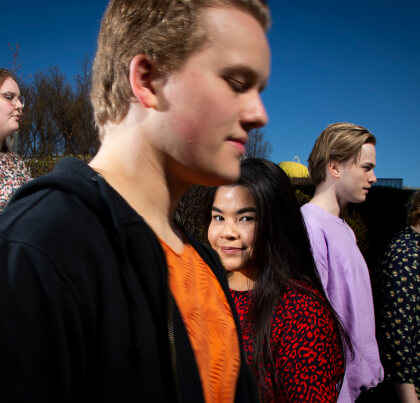
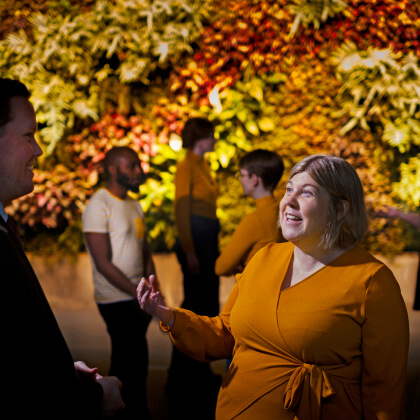
SUSTAINABILITY AND DIVERSITY
GOALS
- Knowledge Contributing to a Sustainable Society
- Sustainable Development
- A Diverse University Community
- Working Together with Society
The world is facing complex challenges. Universities play a key role in promoting public health and well-being, healthy economies and sustainable and just societies through research, specialist knowledge, teaching and public outreach. The University of Iceland will take systematic steps towards a more sustainable world through research and teaching as well as in its own operations. The University will combat the spread of fake news by disseminating research, data and expert knowledge to support official policy and promote democratic debate.
Sustainability is the most pressing challenge facing humankind. The work of the University must make a significant contribution to the development of solutions that will lead us to a more sustainable world. One of the most important contributions the University can make is to ensure that study programmes prepare students to tackle societal challenges and that research increases understanding and creates solutions in the field of sustainability. At the same time, the University will be accountable, taking systematic and meaningful steps toward a better work environment and procedures that make the University a sustainable institution.
Emphasis is placed on encouraging, equipping and enabling researchers to participate in public debate based on scientific and critical thinking, research findings and expertise. A range of channels will be established and technical solutions employed, to improve researchers' engagement and collaboration with various social groups, industries, institutions and the government. A special effort will be made to increase the international visibility of academics and research at the University.
Diversity and equality are the cornerstones of a sustainable society. The University must reflect on and make the most of the value that lies in diverse perspectives and experiences. Listening to the diverse voices of students and staff contributes to the building of a more just society and improves the quality of knowledge creation. Well-being should be paramount at the University of Iceland. Orientation for new staff, a positive work environment and clear information will help to support the diversity of the University's human resources.
KNOWLEDGE CONTRIBUTING TO A SUSTAINABLE SOCIETY
The University will lead the way in sustainability through teaching, research, and knowledge creation
SUSTAINABLE DEVELOPMENT
The University will lead the way in sustainable development by setting measurable targets for carbon neutrality during the strategic period, based on national targets
A DIVERSE UNIVERSITY COMMUNITY
The University will be an even better workplace, ensuring equality and attracting students and staff from diverse backgrounds. Students with immigrant backgrounds will receive special support, and an emphasis will be placed on diversity in the student body
WORKING TOGETHER WITH SOCIETY
The University’s impact on society will be increased with an action plan for improved support and direct dialogue between researchers and stakeholders, in order to combat fake news, reinforce trust in science, and lay the groundwork for public policy
KNOWLEDGE CONTRIBUTING TO A SUSTAINABLE SOCIETY
The University will lead the way in sustainability through teaching, research, and knowledge creation
SUSTAINABLE DEVELOPMENT
The University will lead the way in sustainable development by setting measurable targets for carbon neutrality during the strategic period, based on national targets
A DIVERSE UNIVERSITY COMMUNITY
The University will be an even better workplace, ensuring equality and attracting students and staff from diverse backgrounds. Students with immigrant backgrounds will receive special support, and an emphasis will be placed on diversity in the student body
WORKING TOGETHER WITH SOCIETY
The University’s impact on society will be increased with an action plan for improved support and direct dialogue between researchers and stakeholders, in order to combat fake news, reinforce trust in science, and lay the groundwork for public policy
STRENGTH BASED ON QUALITY
GOALS
- User-Centred Services
- Quality of Learning Prioritised
- High Quality Graduate Studies
- Excellence in Research
Research and teaching are the core of the University of Iceland's operations and the shared responsibility of researchers, faculty, administrative staff, and students. All work at the University is dependent on the quality of research and teaching, while also evolving in response to the needs of students and staff as well as societal changes. Strengthening the learning community and developing online teaching based on an ambitious pedagogical vision will promote a thriving university. Increased support for researchers, high quality graduate programmes, a clearer management framework, and the digitalisation of administration and services will boost the University´s international competitiveness.
Services for staff and students will be developed based on user-centred design. This will result in improved, more efficient services as well as increased job and student satisfaction. Special emphasis will be placed on using information technology to improve services through automated processes, but when this is not possible, high-quality personal services will be provided.
Continuous development of teaching methods and course offerings are the foundations of quality learning and degrees that meet international standards. Digital technology opens up many opportunities to enhance teaching methods, improve communication and meet the different needs of students, e.g., due to residence or disability. Changes to teaching that were implemented in response to the coronavirus pandemic highlighted these possibilities. Continuing digitalisation of learning will take a comprehensive approach. Course design based on sound pedagogical principles, makes it easier for teaching staff to share knowledge, ensure student engagement, strengthen the learning community between students and teaching staff, improve feedback and diversify assessment methods.
On-campus learning at the University of Iceland is thriving and a wide range of online courses are available. Particular emphasis will be placed on developing distance learning, including the establishment of clear quality standards. Dedicated support will be available for faculties to design and promote distance study programmes. It is also important to develop and promote alternate study options at the University, such as lifelong learning, continuing education, and open online courses.
High-quality research requires a diverse pool of human resources as well as solid research frameworks. The University must attract talented researchers with international experience. We must create an environment that enables a dynamic group of graduate students to flourish. Master's programmes at the University vary by school and it is important to continue to develop this level of study based on mapping of its current status. Finally, we must nurture each individual PhD student, ensure funding upon admission, support strong administration of programmes, and encourage PhD students to participate in international collaboration.
USER-CENTRED SERVICES
User-centred services based on the needs of students, faculty and administrators will be prioritised at the University through digital transformation
QUALITY OF LEARNING PRIORITISED
Teaching methods and programme offerings will be continuously developed and form the foundation of the University's quality assurance work, with student satisfaction and quality serving as guiding principles. The development of digital teaching methods, distance learning and open online courses will be prioritised
HIGH QUALITY GRADUATE STUDIES
Emphasis will be on strengthening the framework and funding for doctoral studies as well as expanding the availability of courses at Master´s level
EXCELLENCE IN RESEARCH
Support for researchers will be enhanced through increased access to grants and research infrastructure, as well as open and improved access to research data and findings
USER-CENTRED SERVICES
User-centred services based on the needs of students, faculty and administrators will be prioritised at the University through digital transformation
QUALITY OF LEARNING PRIORITISED
Teaching methods and programme offerings will be continuously developed and form the foundation of the University's quality assurance work, with student satisfaction and quality serving as guiding principles. The development of digital teaching methods, distance learning and open online courses will be prioritised
HIGH QUALITY GRADUATE STUDIES
Emphasis will be on strengthening the framework and funding for doctoral studies as well as expanding the availability of courses at Master´s level
EXCELLENCE IN RESEARCH
Support for researchers will be enhanced through increased access to grants and research infrastructure, as well as open and improved access to research data and findings
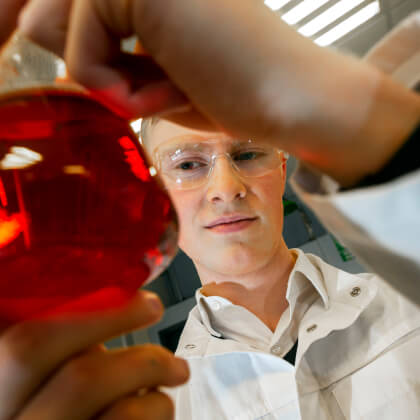
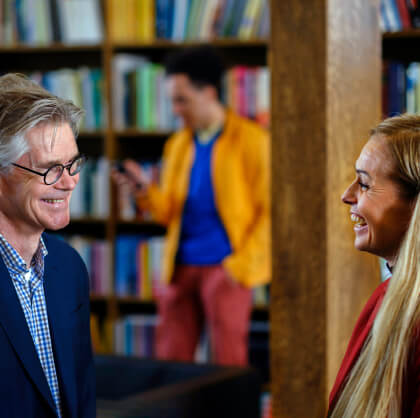
A GOOD PLACE
TO WORK
GOALS
- Human Resources and Job Satisfaction
- Infrastructure for Research and Teaching
- A Thriving Campus
- Finance and Administration
Staff and students form a progressive and vibrant knowledge-based community. Respect and equality allow everyone to reach their full potential. Changes in information technology will have a broad impact on future work environment. Technology must be used to benefit staff, students, and all areas of operations. The University of Iceland welcomes a diverse group of new staff and students and fosters a positive environment with strong research infrastructure and excellent facilities for developing teaching and learning. Campus development, a healthy work environment and sustainable transportation options promote equality of access and a united, sustainable society.
To ensure the competitiveness of the University of Iceland, it is critical to meet staff and students' expectations of a modern, progressive workplace while prioritising the well-being and safety of all. To that end, the University will develop a plan that promotes the health of staff and students while also ensuring that management and organisation support both well-being and job satisfaction. A positive environment and constructive communication are the basis of well-being in the workplace. Managers, staff, and students share responsibility for creating a work environment based on trust, respect, tolerance, and positive interactions. Sexual harassment, violence, and bullying are not tolerated at the University of Iceland.
Over the past years, the University has developed a comprehensive vision for the campus that is based on universal design and focusing on sustainable transportation within the area. Similarly, recruitment processes must support sustainability and diversity. Managers must constantly look for ways to guarantee efficiency.
For the University to be an international leader in research, it must have robust research infrastructure and consistent funding for research projects. Increased interdisciplinary research collaboration and shared development of research infrastructure create significant opportunities. As a result, the University can gain the momentum needed to be more ambitious and successful in obtaining international funding. Visibility and open access will ensure efficient management and use of research infrastructures. It is also critical to ensure open access to research data and safeguard the quality of research by strengthening processes related to research ethics, permits, and data storage.
Along with the development of research infrastructure, teaching infrastructure must be developed in a systemic manner. Plans will be developed for equipment procurement and the construction of teaching facilities that support high quality teaching and learning based on pedagogical principles that encourage student engagement and meet the needs of students.
HUMAN RESOURCES AND JOB SATISFACTION
The University will promote a motivating work environment, with focus on student and staff well-being, that will attract ambitious individuals from diverse backgrounds. Support services and administration will be improved through stronger frameworks, education, and training
INFRASTRUCTURE FOR RESEARCH AND TEACHING
Research infrastructure, facilities and buildings support the advancement of research and teaching, as well as interdisciplinary cooperation and quality of operations
A THRIVING CAMPUS
A comprehensive vision for the University campus will promote equal access and a close-knit knowledge-based community of staff and students from all schools. Priority will be given to universal design, sustainable transportation, and green connections
FINANCE AND ADMINISTRATION
Funding, streamlining, and efficiency in management will be ensured. Funding and salary structure will reflect the University's strategic plan
HUMAN RESOURCES AND JOB SATISFACTION
The University will promote a motivating work environment, prioritising student and staff wellbeing, that will attract ambitious individuals from diverse backgrounds. Support services and administration will be enhanced through stronger frameworks, education and training
INFRASTRUCTURE FOR RESEARCH AND TEACHING
Research infrastructure, facilities and buildings support the advancement of research and teaching, as well as interdisciplinary cooperation and quality of operations
A THRIVING CAMPUS
A comprehensive vision for the University campus will promote equal access and a close-knit knowledge-based community of staff and students from all schools. Priority will be given to universal design, sustainable transportation, and green connections
FINANCE AND ADMINISTRATION
Funding, streamlining, and efficiency in management will be ensured. Funding and salary structure will reflect the University's strategic plan
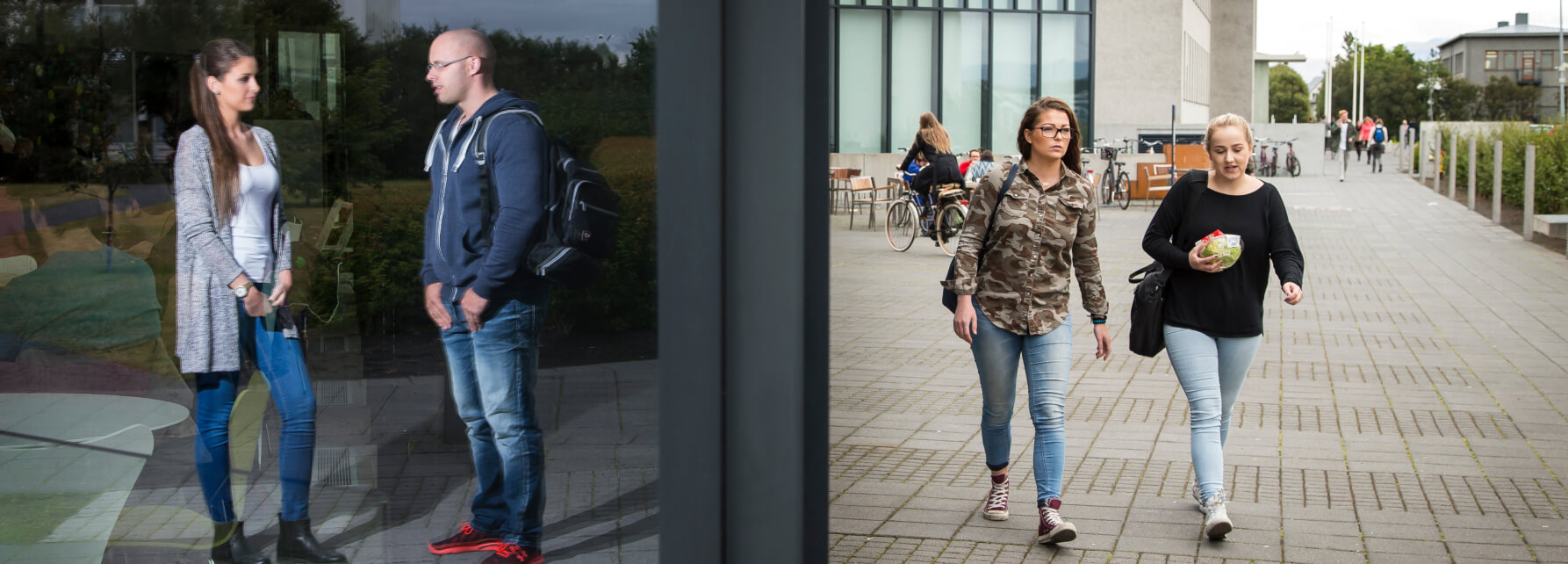
Implementation
of UI26
The goals outlined in UI26 should guide all work at the University. It is important that staff and managers use the goals to prioritise projects and funding. Strategic implementation will centre on clear accountability for the reform projects initiated. Shared strategic accounting, with appropriate metrics, will be introduced in order to provide an objective indication of progress and success at any given point. Managers will also receive additional support to implement the strategy.
The most extensive projects supporting the implementation of UI26 are set out as ten work programmes. Each work programme represents a formal framework for reform projects related to the University's overall interests and may span over several years. The ten work programmes address all the goals of UI26 and establish priority projects for the next few years. Every year, plans for the implementation of each work programme will be developed. The procedures that form the basis of the implementation of UI26 are described in further detail in the implementation plan, which will be available on the University intranet.
Work Programmes
- Increase the number of joint degree programmes with universities abroad and simplify recognition
- Increase teaching collaboration with other Aurora universities, particularly in the areas of sustainability, digital society and citizenship, health and diversity
- Create a selection of international courses open for both domestic and international students to facilitate student and staff mobility
- Increase the integration of information systems for teaching and learning with other Aurora universities
- Improve work environments, make job frameworks clearer and conduct occupational risk assessments
- Improve and expand support for managers and clarify their roles and responsibilities
- Promote increased diversity among staff through recruitment and improve staff induction
- Shape a comprehensive vision for recruitment and job frameworks for employees hired across organisational units
- Ensure that the salary structure reflects the University´s vision
- Remove barriers to interdisciplinary studies
- Implement an internal communications strategy and management dashboard
- Apply user-centred design to develop digital services for students and staff
- Efficient self-service in addition to personalised services at the Service Desk
- Improve services for students and staff who are not native Icelandic speakers both on the intranet and through meetings held in English
- Increase cooperation between the Science Park Innovation Centre, the Careers Connection and UI traineeships
- Interdisciplinary courses in entrepreneurship and social innovation made available to students and teaching staff
- Strengthen the Icelandic language in a changing world, e.g., through the development of language technology
- Foster a culture of innovation and support the exploitation of research
- Establish a consultation platform for innovation and societal impact
- Increase collaboration on innovation and research with other levels of the education system
- Map and create a plan for communication and collaboration with key stakeholders in order to combat fake news, strengthen trust in science and make the societal impact of research more visible. Increase direct communication channels and ensure that standardised promotional materials support the University's open and interdisciplinary image
- Increase support for collaboration between academic staff and institutes as well as work that underpins public policy-making
- Increase the visibility of research to the international academic community with special focus on the University's English website
- Expand the Sprettur project to serve as a platform for diverse collaboration with people of foreign origin and institutions working on immigrant interests and rights
- Map collaboration with regional communities and propose plans for further development
- Raise awareness and understanding of sustainability through presentations and workshops as well as through sustainability research and education dashboards
- Focus on sustainability in teaching and learning by increasing the number of courses and support for teachers. Make study programmes and courses related to sustainability available for students from all disciplines
- Work towards making the University carbon neutral by mapping emissions and introducing countermeasures
- Evaluate whether sustainability and interdisciplinary should be taken into account when allocating grants from the University's competitive funds
- Improve pre- and post-award services for researchers to assist them in winning international grants, e.g., through project management offices, both centrally and in schools
- Review processes for recruiting research staff, e.g., criteria for international experience, and improve induction processes
- Develop a clear vision for open science that encourages interdisciplinary work and increased research impact
- Create a comprehensive vision for research ethics and strengthen research permit processes through increased recording, support and supervision
- Raise the visibility of research within the University in order to promote research collaboration across schools and faculties
- Review the status of Master's studies, make improvements based on the findings and strengthen selected programmes. Increase collaboration between the Graduate School and faculties in the development of Master's studies
- Achieve a balance in the admission and graduation rates of PhD students by improving support for student progression and encouraging better communication between students and supervisors
- Increase the number of grants awarded at the time of admission to doctoral studies or granted for a period of four years
- Increase the mobility of PhD students, as well as interdisciplinary and international collaboration in doctoral studies, e.g., through international university networks
- Increase collaboration on research infrastructure both within and outside the University, e.g., through registration of research infrastructure
- Guarantee funding for research infrastructure while taking management plans into account, and optimise procurement of research supplies
- Create an annual plan for developing teaching facilities and equipment in all schools, based on a pedagogical vision
- Develop the campus with a focus on universal design, a united University community and sustainable development. Prioritise the completion of the School of Health Sciences building, complete the relocation of the School of Education onto campus and construct a new building for the School of Engineering and Natural Sciences
- Increase participation in international research infrastructure projects
- Increase support for teaching staff in the use of IT in teaching and award grants to faculties to develop distance study programmes and open online courses
- Increase opportunities for teaching staff to develop their teaching and evaluate possibilities for academic teaching positions
- Ensure that course offerings are reviewed on a regular basis in order to meet the needs of students and the labor force and develop a comprehensive vision for the development and delivery of lifelong learning and continuing education
- Increase support for international students and students with immigrant backgrounds and introduce measures to increase diversity in the student population

Metrics
OPEN AND
INTERNATIONAL
- Peer-reviewed publications in collaboration with international partners
- Students who take part of their studies at a university abroad
- Patents, licences, and start-up companies
- Student assessment of work readiness after graduation
SUSTAINABILITY
AND DIVERSITY
- Contribution of teaching and research to the SDGs based on international metrics
- Carbon footprint of transportation and operations
- Student gender ratio by faculty and percentage of students of foreign origin
- Peer-reviewed publications in collaboration with industry
- Collaboration with public institutions and contribution of academics in public debate in Iceland
STRENGTH BASED
ON QUALITY
- Staff satisfaction with services
- Student satisfaction at undergraduate and graduate levels
- Graduation rate
- Public trust in the University of Iceland
- Grade from the Quality Board for Icelandic Higher Education
- Position in international rankings
A GOOD PLACE
TO WORK
- Job satisfaction
- Workloads and work-related stress
- Gender-based differences in wages and professional title
- Satisfaction with research support services
- Public funding and non-governmental funding comparable to other Nordic universities
